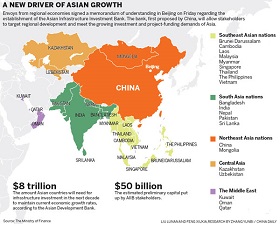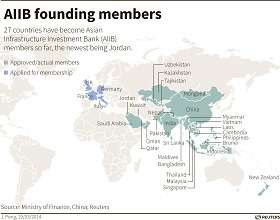It has recently been reported that France, Germany and Britain are joining the Asian Infrastructure Investment Bank (AIIB), a major Chinese initiative launched in 2013, which now incorporates 32 states, five of them in Europe, plus New Zealand. Russia is so far outside the process, which complicates its rapprochement with Asian states. We offer the insights of Yaroslav Lisovolik, Chief Economist and Director of Analytic Department at Deutsche Bank AG in Russia.
It has recently been reported that France, Germany and Britain are joining the Asian Infrastructure Investment Bank (AIIB), a major Chinese initiative launched in 2013, which now incorporates 32 states, five of them in Europe, plus New Zealand. Russia is so far outside the process, which complicates its rapprochement with Asian states. We offer the insights of Yaroslav Lisovolik, Chief Economist and Director of Analytic Department at Deutsche Bank AG in Russia.
How would you comment the decision of France, Germany and Britain to join the AIIB?
The move reflects European interest in greater integration with Asia, today's global economic hub. The region also is also home to the bulk of global economic reserves. On the one hand, Europe may obtain access to more lucrative projects, and on the other, participation in the AIIB should help Europe build up its economic presence in Asia. Accordingly, the bank may open up opportunities for attracting assets and investments to Europe, which badly needs such resources, especially now when its economy leaves much to be desired. This year, the growth rate in the Eurozone will barely exceed one percent.
Europe is still facing major challenges due to its immense debts and grave economic misbalances, in part because its periphery is in dire straits. The rationale for joining the AIIB also has a global context, since the Asia pivot is definitely becoming pervasive. In these conditions, Europe is bound to seek ways to integrate into Asian structures and identify opportunities for setting up joint institutions. Incidentally, one of the bank's projects focuses on developing transportation routes within the Great Silk Road initiative intended to connect Europe and Asia.
The participation of European countries may create additional bridges between Europe and Asia and help solidify the bond between the EU and Asian integration groups.
Russia could gain a lot through participation in projects linking Europe and Asia. Moscow has joined the Asia-Europe Meeting but remains a missing link in the global chain of integration groups and transcontinental Asia-Europe contacts. We see ties between America and Asia solidifying in the Asia-Pacific on the APEC platform and dynamic talks on trans-Atlantic integration between Europe and America. The Eurasian project is regrettably outside the emerging common development strategy for Asia and Europe, as it is institutionally unrefined and requires a lot of adjustments. Such projects are definitely good for global economic stability and regional development of Europe, Asia and Russia.
Could Russia join the group?
There is a chance that Moscow will do just that quite soon, maybe this year, since Russia's foreign economic policy is advancing along the same lines. Besides, Russia seems willing to focus on getting closer to ASEAN, i.e. to such powerful regional economies as South Korea and Japan.
Alongside participating in these and similar banking structures, Russia may work harder to create free trade areas: one is already under discussion with Vietnam. Other countries may also jump in. To this end, various projects that could facilitate liberalization of national economies and mutual integration of national economies are something from which Russia would undeniably gain.
Interviewer: Maria, Gurova, RIAC Website Editor






